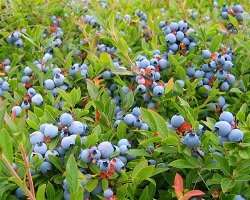Blueberries may improve attention in children following double-blind trial

Primary school children could show better attention by consuming flavonoid-rich blueberries, following a study conducted by the University of Reading.
In a paper published in Food & Function, a group of 7-10 year olds who consumed a drink containing wild blueberries or a matched placebo and were tested on their speed and accuracy in completing an executive task function on a computer.
The double blind trial found that the children who consumed the flavonoid-rich blueberry drink had 9% quicker reaction times on the test without any sacrifice of accuracy. In particular, the effect was more noticeable as the tests got harder.
Professor Claire Williams, a neuroscience professor at the University of Reading said:
"This is the first time that we have seen the positive impact that flavonoids can have on the executive function of children. We designed this double blind trial especially to test how flavonoids would impact on attention in young people as it's an area of cognitive performance that hasn't been measured before.
"We used wild blueberries as they are rich in flavonoids, which are compounds found naturally in foods such as fruits and their juices, vegetables and tea. They have been associated with a range of health benefits including antioxidant and anti-inflammatory effects, and our latest findings continue to show that there is a beneficial cognitive effect of consuming fruit and vegetables, tea, coffee and even dark chocolate which all contain flavonoids."
The children were then asked to pay attention to an array of arrows shown on a PC screen and press a key corresponding to the direction that the central arrow was facing. The task was repeated over a number of trials, where cognitive demand was manipulated by varying how quickly the arrows appeared, whether there were additional arrows appearing either side of the central arrow, and whether the flanking arrows were pointing in the same/different direction as the central arrow.
Previous Reading research has shown that consuming wild blueberries can improve mood in children and young people, simple memory recall in primary school children, and that other flavonoid rich drinks such as orange juice, can also improve memory and concentration.
The Wild Blueberry Association of North America provided a freeze-dried powder made from wild blueberries which was used in the study but did not provide any additional financial support and did not play a role in the design of the study.
Wild blueberries are grown and harvested in North America, and are smaller than regular blueberries, and are higher in flavonoids compared to regular varieties.
The double-blind trial used a flavonoid-rich wild blueberry drink, with a matched placebo contained 8.9g of fructose, 7.99g of glucose and 4 mg of vitamin C matching the levels of nutrients found in the blueberry drink.
The amount of fructose is akin to levels found in a standard pear.
This was an executive function task- requiring participants to pay attention to stimuli appearing on screen and responding correctly. The task was a simple one- responding to the direction of an arrow in the middle of a screen (by pressing left/right arrow key) but we then varied how quickly the stimuli appeared, whether there was additional arrows appearing either side of the stimuli and whether those flanking arrows were pointing in the same/different direction as they direction you had to respond.
There are 6 main classes of flavonoids:
- Anthocyanins – found in berry fruits such as the blueberries used in this study and also in red wine.
- Flavonols - found in onions, leeks, and broccoli
- Flavones - found in parsley and celery,
- Isoflavones - found in soy and soy products,
- Flavanones - found in citrus fruit and tomatoes
- Flavanols—found in green tea, red wine, and chocolate
More information: A. R. Whyte et al. The effect of cognitive demand on performance of an executive function task following wild blueberry supplementation in 7 to 10 years old children, Food Funct. (2017). DOI: 10.1039/c7fo00832e
Peter Anderson. Assessment and Development of Executive Function (EF) During Childhood, Child Neuropsychology (2003). DOI: 10.1076/chin.8.2.71.8724
















